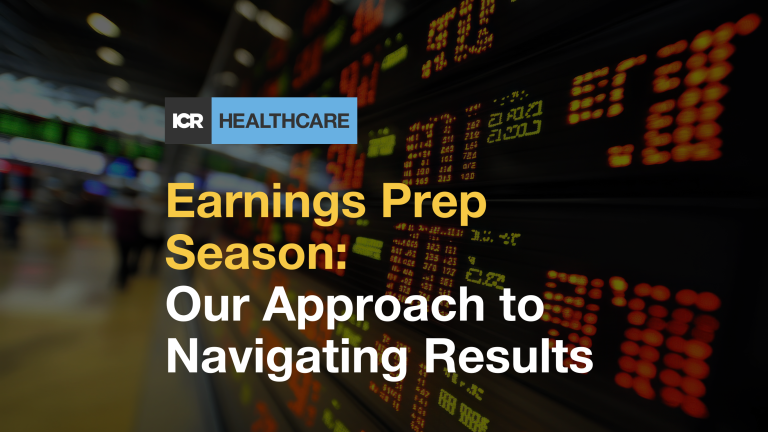During an analyst day, all eyes are on the company hosting the event. It’s an ideal environment for a company to tell its story, answer questions, and give analysts and investors a deeper understanding of the business. But planning for that kind of event takes months of preparation — and unless companies have staff who are well-versed in event management, it’s easy to overlook essential details, underestimate budget needs, and fail to deliver effective content.
With experience planning more than 100 events, the ICR Event Planning and Management team has seen the full spectrum of mistakes and oversights that companies make when planning an analyst day using internal resources. Here are some of the most common blunders made during the event planning process.
1. Inadequate Preparation Time and Resources
Companies often begin planning analyst or investor days using in-house resources. Generally, those companies run into two common challenges: lack of time and lack of dedicated staff.
“Companies approach an event management firm for help when they realize how much time it’s going to take to get all of the details ironed out,” says ICR Director of Marketing and Events, Abby Slagle, CMP. Generally, the more time allotted to plan an event, the better. A straightforward event hosted at a Manhattan venue may only require three or four months to plan, but the more complex the logistics — for example, if a company plans to produce a video or host the event at its headquarters to provide factory tours —need to be mapped out several months in advance.
In addition, the staff members who typically get put in charge of the event — usually a corporate IR or PR team member — have to take time away from their other priorities to manage the event. Or, they miss crucial steps due to lack of event planning experience. “Often, they put the majority of their focus on producing the deck,” says Slagle, “And all of the other details fall by the wayside.”
2. Lack of a Support Team
Some companies assume that they can save on costs by organizing the event on their own. But without a support team, costs may actually be higher, simply because they don’t have extensive experience with the logistics of such an event.
For instance, someone who has never booked a hotel space may not be familiar with the negotiation process. They may accept the hotel’s initial terms and end up spending more simply because they didn’t know what to look for in the contract. Similarly, inexperienced event planners may order more inventory than is actually required or wait too long to place orders, incurring rush charges. “They end up spending where they don’t need to,” says Slagle.
3. Inaccurate Budget
When budgeting for the event, companies often focus on core costs, such as the venue, travel-related expenses, and catering, but a lack of experience means they overlook the more minute details, which can add up in cost. Beyond those major line items, there’s more to consider, such as gifts for attendees, event transcripts, producing signage, and more. “These types of things aren’t often considered when companies create their budgets for their events,” says Slagle.
Experienced event management firms can bring to light considerations that can add value to event. For instance, some companies opt to host analyst days at their factories or headquarters, so they can give attendees tours and insight into their production process — and minimize venue-related expenses.
“That type of event will cost less for the company, but it puts an additional burden on the analyst or investor who has to travel to the event,” says Slagle. Hosting the event at a venue that’s closer to the company’s investor base (typically in a major metro area like New York City) can help boost attendance, ensuring the company gets in front of a larger audience of investors and analysts.
4. Lack of Consideration in Venue Choice
Where a company chooses to host its analyst day can play a significant role in the success of the event, so leaders must carefully weigh their options. “If there is something compelling about your location — for instance if it is important for attendees to see the production of a new battery in your factory, and that’s a key part of your story — it might make sense to have the event at your headquarters,” says Slagle.
But there are also ways to bring a unique story to the attendees while hosting an event in a more accessible location. Slagle provides an example of an oil rig company overseas that wanted to have an in-person event. However, it would have been incredibly difficult to get analysts and investors to the rig, so instead, the company invested in a video that could give stakeholders the feel of being on location without the challenging logistics. “In this kind of scenario, it’s worth spending the money to show investors what it would be like to be there in person,” she says.
5. Limited Accessibility
Expanding access to the event can have a huge impact on who hears your story. “Hybrid isn’t dead,” says Slagle. She notes that when companies offer a virtual component, they often see a dramatic increase in attendance. For example, a company might only have 60 in-person attendees, but 200 additional attendees log in to view the virtual portion of the day.
“I know people want to shake hands, but providing accessibility in a virtual environment is still super important,” Slagle says. That could mean offering a live stream of the event or a recording that can be viewed on demand. Either way, this provides the opportunity for more analysts and investors to attend, especially those who aren’t local to the event location or may only have a few hours to spare, rather than an entire day.
6. Ineffective Communication
Effective communication leading up to an analyst or investor day plays a critical role in the success of the event — but without an experienced event manager or firm, that can be quite a challenge. “You have to know who your audience is, how to reach them, when to reach them, and how often to get in front of them,” says Slagle.
This includes providing timely information about the event date, time and venue: “You cannot send out invitations to targets to attend an event across the country two weeks beforehand,” Slagle says. But it also includes a wide range of other communications at a regular cadence, including reminders, company and product updates, and other messaging that can help get attendees in the door.
Hosting an effective analyst and investor day requires ample time and carefully thought-out logistics. Partnering with an experienced team means everything — from contract negotiation and registration management to the execution of a communications package — is expertly handled. Your company hosts a smooth and successful event with the right combination of investor and analyst attendees — without taking your team away from their other priorities.
ICR Event planning and Management provides the technology, logistics, and management to support all virtual, hybrid, or in-person event needs for analyst and investor days and has helped companies host more than 100 successful events. To speak to ICR about hosting your next event, contact us.



